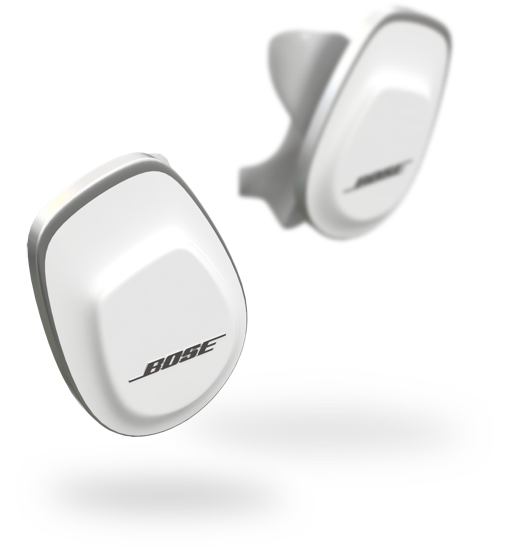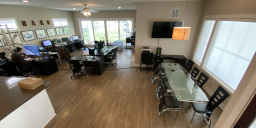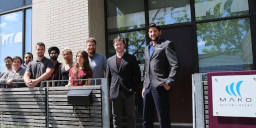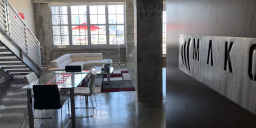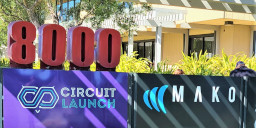With Ethan Escowitz, Founder of Arris Composites
Hosted by Kevin Mako, President of MAKO Design + Invent
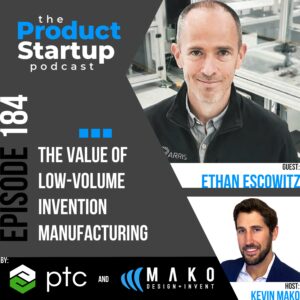
Ethan Escowitz, the founder of Arris Composites, heads a company specializing in advanced manufacturing processes and materials. With two decades of experience in the industry, collaborating with numerous Fortune 500 companies and hardware startups, he also serves on several hardware-related boards. Today, Ethan will share his valuable insights on short-run manufacturing, the significance of iterative manufacturing for hardware startups, and strategies to scale through feedback on low-volume production runs of new hardware product inventions.
Today you will hear us talk about:
- Discover the transformative potential of new manufacturing capabilities for product developers.
- Expedite your product production process to maximize efficiency.
- Benefit from low-volume parts without the need for expensive upfront tooling costs.
- Harness technology to enable low-volume production and empower your manufacturing.
- Differentiate between consumer-facing products and non-consumer-facing products.
- Cater to consumer demands for high-quality, aesthetically pleasing parts.
- Leverage advanced technology to create unique, beautifully designed parts that diverge from conventional moulding methods.
- Challenge the invention manufacturing world’s traditional limitations and drive innovation.
- Utilize the first production run to gain valuable insights into customer buying patterns and areas for engineering improvement.
- Navigating the complexities of product engineering becomes even more challenging when integrating new capabilities and technologies, but the rewards are substantial as you uncover remarkable advancements.
- Embrace innovation and new technologies to significantly increase the equity valuations of your product inventions and the underlying technology.
- Hardware startups enjoy a significant advantage in terms of agility and innovation.
- Avoid feature creep in your initial version and prioritize customer input.
- Following Steve Jobs’ philosophy, identify unmet needs and communicate your unique product idea that revolutionizes the market.
EPISODE HIGHLIGHTS
- 1:30 – There are many manufacturing technologies making it faster, easier, better quality, and lower cost to go into low volume production without the major up-front tooling costs.
- 3:00 – The zero to one model of manufacturing a new hardware product invention.
- 3:45 – Produce product as quickly as possible to get design feedback.
- 3:50 – Traditional manufacturing has up front tooling cost and a large minimum order quantity for production.
- 4:00 – Additive manufacturing allowed products to go to market faster and without the upfront capital costs of tooling and molds.
- 4:30 – How do you eliminate variable cost manufacturing?
- 5:00 – Think about going to market with 3 different models of your product, or start with one, and iterate.
- 5:30 – There is a large emphasis in the product development world on building first a minimum viable product.
- 5:45 – The largest milestone for a hardware startup is the first time you get even just a few units sold to real customers who leave positive feedback.
- 6:15 – The leap from your final developed prototype to the first production run is getting easier and cheaper.
- 7:45 – Consumer-facing products and business-to-business products
- 8:00 – A lot of technologies are good for making industrial widgets, but more technologies are coming for high-quality products that appear as top-of-the-line manufactured products that consumers are expecting.
- 9:00 – The cost of additive manufacturing is high per unit, but there are new technologies coming out that are reducing the unit cost for initial production runs of new hardware products.
- 10:00 – Traditional manufacturing does not allow a lot of iteration between production runs until now.
- 10:30 – Customer feedback and design engineering feedback in manufacturing are two very important feedback loops.
- 10:45 – Use feedback to ensure product-market fit.
- 10:00 – Agile development can now be done in hardware.
- 11:15 – You can adjust between manufacturing runs for both opportunities and problems, making the best of both.
- 12:15 – Engineering validation is so critical, and it is extremely difficult, even if it is just on conventional design. As you introduce anything new to the product, whether capabilities or technologies, each of those significantly increases the design complexity. However, if you can overcome those obstacles, you develop incredibly valuable technology.
- 13:45 – One of the bottlenecks of a new hardware product is feature creep. Focus on the core innovation.
- 14:00 – Technology is experimental and takes a lot of effort to figure out.
- 14:45 – New technology that is used by the customer is a big deal.
- 15:15 – Hardware startups have a huge advantage over large corporations on taking risks to capture pieces of the market.
- 16:30 – Know that extra features may not actually be valuable to your customers, so don’t add the additional risk in development and manufacturing.
- 17:45 – Never sacrifice quality on a first product launch, but do sacrifice the number of features.
- 18:45 – Also have some personal passion and personal decision-making to fulfill the vision you see for your product. Don’t rely solely on feedback, use it in making a final decision that you as the founder believe is best.
- 20:00 – Make sure your story is still strong behind the new features of your product.
Ethan Escowitz Links:
The Product Startup Podcast Links:
https://www.ProductStartup.com/
Instagram | LinkedIn | Facebook Page | Facebook Group | Pinterest | Twitter | YouTube
PTC Links:
https://www.ptc.com/
OnShape | Creo
Mako Design Links:
https://www.makodesign.com/
YouTube | Instagram | LinkedIn | Facebook | Pinterest | Twitter
Kevin Mako Links:
Instagram | LinkedIn | Quora | Facebook | Twitter
Partner: PTC’s best-in-class software solutions Onshape: The only cloud-native product development platform that delivers full-featured computer-aided design (CAD), integrated product data management (PDM) and enterprise analytics in a single system, and Creo: 3D CAD solution that provides designers with the most innovative tools to build better products faster, such as generative design, additive manufacturing, real-time simulation, IIoT, and augmented reality.
